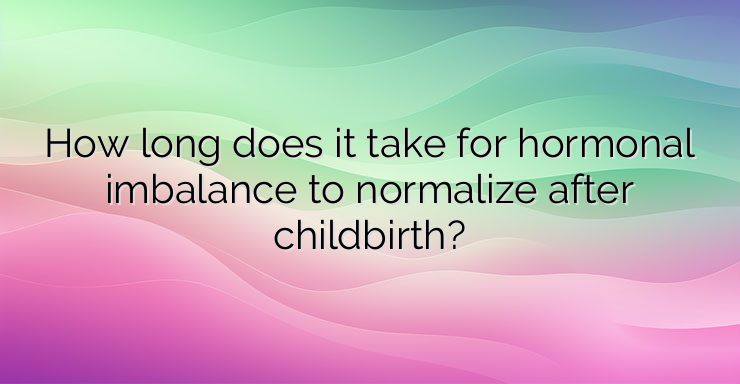The body undergoes many changes in preparation for childbirth. During pregnancy, hormone levels rise and fall, which affects a woman’s physical and emotional state. After childbirth, many women still feel emotional, irritable, sensitive. The good news is that the “postpartum emotional rollercoaster” is completely normal and largely due to hormonal changes. But how long will it take for hormone levels to normalize after giving birth? What are the symptoms of hormonal imbalance? Hormonal effects during pregnancy and postpartum The lasting effects of multiple hormones can affect daily activities. Estrogen and progesterone play the most important role of all. During pregnancy, they support the growing fetus and rapidly changing body. In pregnancy, progesterone levels rise significantly early, preparing the endometrium and its vessels to provide nutrients to the fetus. Progesterone also blocks uterine contractions to prevent premature birth. Prolactin stimulates milk production and remains in the body as long as the breastfeeding process continues. It affects behavior, metabolism, immune system function, and fluid regulation. Prolactin is one possible explanation for occasional mood swings after childbirth. Oxytocin is another hormone that is important for birth and breastfeeding. It causes uterine muscle contractions during labor, then stimulates the secretion of milk from the milk ducts. Research from several studies has shown that oxytocin also affects social behavior. For example, oxytocin can stimulate feelings of trust and bonding (such as mother-infant bonding or intimacy) or opposite responses such as defensiveness. Relaxin is secreted by the ovaries, placenta and uterine lining throughout pregnancy. During the first and second trimester, it inhibits muscle contractions, preventing premature birth. It later stimulates the rupture of the membranes around the fetus before softening the cervix and vagina and loosening the pelvic ligaments to facilitate labor. Therefore, during pregnancy, women are more prone to sprains or overstretching muscles during physical activity, jeopardizing joint health. Despite the fact that every woman produces these same hormones during and after pregnancy, not everyone has the same emotional experience. This suggests the presence of other intervening factors besides hormonal activity in the onset of postpartum depression. Thyroid hormone levels can change after childbirth, and there are several possible reasons. The thyroid gland may respond to bouts of inflammation (ie, thyroiditis) by releasing additional hormones and presenting with the following symptoms:Anxiety; Irritability; Fast pulse; Unexplained weight loss; Increased sensitivity to heat; Fatigue; Tremor; Insomnia. Over time, thyroid cells can be destroyed, leading to hypothyroidism, or an underactive thyroid. The condition is characterized by: Intolerance to cold; Weight gain (increased appetite); Hypoactivity; Fatigue; Constipation; Proximal muscle weakness; Myxedema; Dry skin that is cool to the touch; Brittle hair; Slow heart rate; Difficulty breathing on exertion. Postpartum thyroiditis can last up to 18 months, so in the presence of some of the listed symptoms, consultation with a specialist is recommended. Postpartum hormonal mood swings, poor sleep, lack of appetite, depression and anxiety, as well as overwhelming urges to cry, can become commonplace. Fortunately, the “baby blues” usually subside after a week or two. When these feelings persist or worsen, they may be indicative of postpartum depression. References: 1. Sahay, Rakesh Kumar, and V Sri Nagesh. “Hypothyroidism in Pregnancy.” Indian Journal of Endocrinology and Metabolism, Medknow Publications & Media Pvt Ltd, May 2012, www.ncbi.nlm.nih.gov/pmc/articles/PMC3354841/. 2. Schiller, Crystal Edler, et al. “The Role of Reproductive Hormones in Postpartum Depression.” CNS Spectrums, US National Library of Medicine, Feb. 2015, www.ncbi.nlm.nih.gov/pmc/articles/PMC4363269/. 3. Mayo Clinic Staff. “Postpartum Thyroiditis.” Mayo Clinic, Mayo Foundation for Medical Education and Research, 21 Dec. 2018, www.mayoclinic.org/diseases-conditions/postpartum-thyroiditis/symptoms-causes/syc-20376675.”The Role of Reproductive Hormones in Postpartum Depression.” CNS Spectrums, US National Library of Medicine, Feb. 2015, www.ncbi.nlm.nih.gov/pmc/articles/PMC4363269/. 3. Mayo Clinic Staff. “Postpartum Thyroiditis.” Mayo Clinic, Mayo Foundation for Medical Education and Research, 21 Dec. 2018, www.mayoclinic.org/diseases-conditions/postpartum-thyroiditis/symptoms-causes/syc-20376675.”The Role of Reproductive Hormones in Postpartum Depression.” CNS Spectrums, US National Library of Medicine, Feb. 2015, www.ncbi.nlm.nih.gov/pmc/articles/PMC4363269/. 3. Mayo Clinic Staff. “Postpartum Thyroiditis.” Mayo Clinic, Mayo Foundation for Medical Education and Research, 21 Dec. 2018, www.mayoclinic.org/diseases-conditions/postpartum-thyroiditis/symptoms-causes/syc-20376675.


Leave a Reply